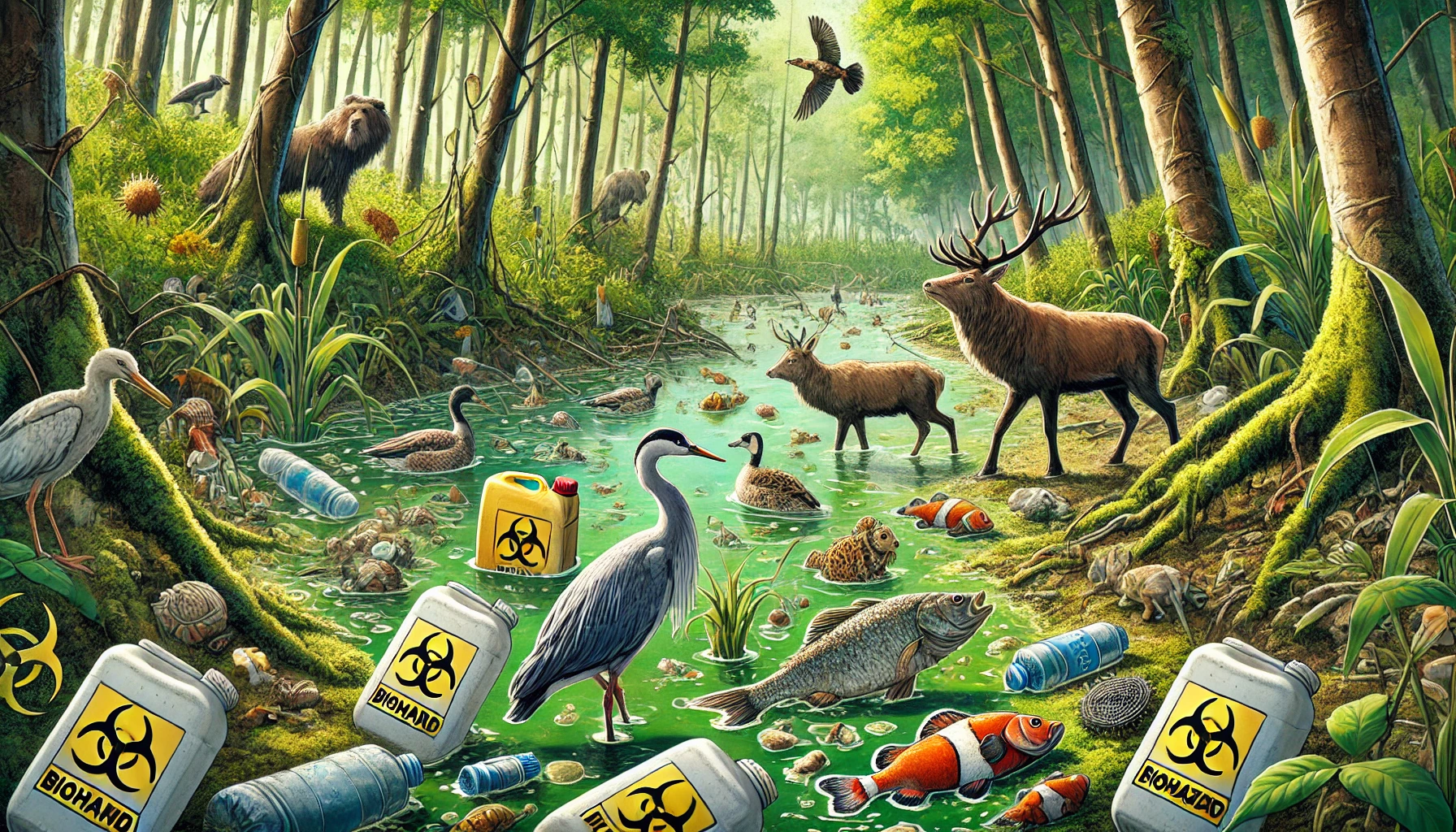The Environmental Impact of Biohazard Waste: Risks, Consequences, and Sustainable Solutions
Biohazard waste, also known as biomedical or infectious waste, consists of materials that contain potentially harmful biological agents. These can include bacteria, viruses, toxins, and other microorganisms that pose risks to human health and the environment.
Improper disposal of biohazard waste can lead to serious environmental contamination, affecting air, water, and soil quality. As healthcare, laboratories, and industries continue to produce large amounts of biohazardous materials, proper waste management is crucial to minimizing ecological damage.
Types of Biohazard Waste
Biohazard waste is categorized into several types, each requiring specific disposal methods to prevent environmental and health risks:
- Infectious Waste: Includes contaminated materials such as used gloves, bandages, and lab cultures that may carry bacteria or viruses.
- Sharps Waste: Includes needles, scalpels, broken glass, and other objects that can puncture the skin and transmit infections.
- Pathological Waste: Human and animal tissues, organs, or fluids that may contain infectious agents.
- Pharmaceutical Waste: Expired or unused medications and chemicals that can contaminate water sources if improperly discarded.
- Chemical Biohazard Waste: Toxic chemicals and disinfectants used in laboratories, hospitals, and industries.
- Radioactive Biohazard Waste: Waste from medical treatments and research containing radioactive elements that require specialized disposal methods.
How Biohazard Waste Affects the Environment
When biohazard waste is not properly managed, it can cause severe environmental damage:
- Soil Contamination: Hazardous waste dumped in landfills can seep into the soil, affecting plant life and groundwater supplies.
- Water Pollution: Pharmaceuticals, chemicals, and pathogens from biohazard waste can enter rivers, lakes, and oceans, endangering marine life and contaminating drinking water.
- Air Pollution: Burning biohazard waste without proper filtration releases toxic gases and harmful pathogens into the air, leading to respiratory issues and environmental degradation.
The Role of Improper Disposal in Environmental Damage
Improper disposal of biohazard waste can have devastating effects on ecosystems and public health:
- Dumping untreated waste in landfills allows pathogens and toxic substances to spread, affecting local wildlife and human communities.
- Flushing pharmaceutical waste down drains leads to drug contamination in water supplies, potentially harming aquatic species and disrupting ecosystems.
- Open burning of medical waste contributes to air pollution by releasing dioxins and other hazardous chemicals that pose respiratory risks.
The Impact of Biohazard Waste on Wildlife and Ecosystems
Wildlife and natural ecosystems are particularly vulnerable to biohazard waste contamination. Some of the most concerning impacts include:
- Ingesting toxic substances: Animals often mistake biohazardous materials for food, leading to poisoning, internal injuries, and fatalities.
- Disrupting food chains: Contaminants from biohazard waste can accumulate in organisms, affecting entire ecosystems and biodiversity.
- Destroying habitats: Soil and water pollution from hazardous waste can lead to the destruction of plant life and the loss of essential wildlife habitats.

Safe Disposal Methods for Biohazard Waste
To mitigate environmental risks, biohazard waste should be handled and disposed of using proper procedures:
- Segregation: Separating different types of biohazard waste into designated containers prevents cross-contamination.
- Autoclaving: Using high-pressure steam sterilization to neutralize infectious agents before disposal.
- Chemical Treatment: Applying disinfectants to destroy harmful pathogens in liquid waste.
- Incineration: Burning hazardous waste in controlled facilities equipped with emission filters.
- Secure Landfilling: Ensuring waste is contained in specialized landfills designed to prevent leakage into the environment.
Laws and Regulations for Biohazard Waste Management
Governments and regulatory bodies have established laws to ensure proper biohazard waste disposal:
- The Environmental Protection Agency (EPA): Enforces regulations for hazardous waste disposal in the U.S.
- The Occupational Safety and Health Administration (OSHA): Establishes guidelines for handling biohazardous materials in workplaces.
- The World Health Organization (WHO): Provides global recommendations for safe biohazard waste management.
- Local Environmental Agencies: Enforce region-specific rules for waste treatment and disposal.
Strict compliance with these regulations is essential to prevent environmental and public health risks.
Steps to Reduce Biohazard Waste Pollution
Individuals, businesses, and organizations can take proactive measures to minimize biohazard waste pollution:
- Reduce waste generation: Implement strategies to minimize unnecessary medical or laboratory waste.
- Use eco-friendly alternatives: Opt for biodegradable medical supplies and non-toxic disinfectants.
- Educate and train staff: Ensure workers handling biohazard waste are trained in proper disposal methods.
- Support recycling programs: Encourage the safe recycling of non-contaminated medical materials and packaging.
The Importance of Responsible Biohazard Waste Management
Biohazard waste poses a significant threat to the environment if not managed properly. From soil and water contamination to harmful effects on wildlife, improper disposal has long-term consequences. By implementing safe disposal methods, following legal regulations, and promoting responsible waste management practices, we can protect our environment and public health.
Addressing biohazard waste is a collective responsibility. Governments, businesses, and individuals must work together to ensure a safer and healthier planet for future generations.
How Denver Decon Ensures Compliance And Safety In Biohazard Waste Disposal
At Denver Decon, we take the safety of our employees, clients, and the environment very seriously. Here’s how we make sure we follow all the necessary rules and guidelines for biohazard waste disposal:
- Strict Safety Protocols: We have detailed procedures in place to ensure that all biohazard waste is handled with care. Our team wears the proper protective equipment and follows safety guidelines at every step of the process.
- Certified Professionals: All of our workers are trained and certified to handle biohazard waste. They are experts in cleaning up hazardous materials and know how to do it safely.
- Environmental Responsibility: We are committed to reducing the environmental impact of our services. We use eco-friendly disposal methods. We also partner with certified facilities that prioritize sustainability.
Following these practices helps us dispose of biohazard waste safely and responsibly. This keeps us in line with local, state, and federal laws.
Bio Waste Cleaning Services: How We Help Keep Your Environment Safe
We offer a variety of bio waste cleaning services to help you maintain a safe and healthy environment. Whether you're dealing with medical waste, chemicals, or biohazard materials, our team is here to help. Our services include:
- Medical Waste Cleanup:
We handle and dispose of medical waste, including syringes, bandages, and other hazardous materials.
- Crime Scene Cleaning:
We offer cleaning services for crime scenes, ensuring that the area is sanitized and safe.
- Chemical Spill Cleanup:
We quickly and safely clean up any spills of hazardous chemicals. This helps prevent further contamination.
We offer bio waste cleaning services. We make sure that any area with biohazard waste is cleaned well. Then, we restore it to a safe condition.


